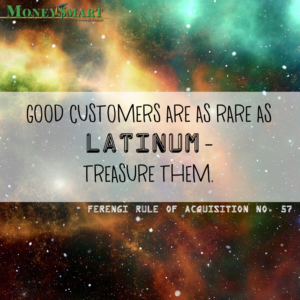“Good customers are as rare as latinum -- treasure them.” Ferengi Rule of Acquisition No. 57
Have you ever heard of the “Scotty Principle?” I’ll fill you in if you’re not a Trekie: It derives from a character from the Star Trek shows and movies known as Lt. Cmdr. Montgomery Scott, aka ‘Scotty,’ consistently making the seemingly impossible happen just in time to save their ship Enterprise from disaster. He would tell Cpt. Kirk that it would take him hours to make the repairs needed and then heroically have them done sooner and “just” in time. This is the art form known as underpromising and overdelivering to your customers. It is considered a strategic planning technique, but today’s customer is very savvy and lives in an on-demand economy. For small businesses in both service and product industries, underpromising can hurt your strategic planning goals and turn away your customers rather than please them.
 In practice, underpromising is the result of an intentional “padding” of the amount of time or the cost estimate and then bringing results in sooner or at a better cost. The dangers of this practice are that it does not: (1) foster reasonable expectations with your customers; (2) establish credibility; (3) create customer loyalty (and you need loyal customers now and always); and (4) it simply is not in integrity. If customers become accustomed to a business always refunding them money because they always overcharged them the first time, it would become an inconvenience and an annoyance to expect to have to hand over the credit card twice. They might question if it was “just them” or if it was like that with everyone and thus, when they talked about that business with other people, the discussion would be about that, and not the quality of the product or great customer service. Do you want this to be you:
In practice, underpromising is the result of an intentional “padding” of the amount of time or the cost estimate and then bringing results in sooner or at a better cost. The dangers of this practice are that it does not: (1) foster reasonable expectations with your customers; (2) establish credibility; (3) create customer loyalty (and you need loyal customers now and always); and (4) it simply is not in integrity. If customers become accustomed to a business always refunding them money because they always overcharged them the first time, it would become an inconvenience and an annoyance to expect to have to hand over the credit card twice. They might question if it was “just them” or if it was like that with everyone and thus, when they talked about that business with other people, the discussion would be about that, and not the quality of the product or great customer service. Do you want this to be you:
Person 1: “Do you want to go to that restaurant for lunch?”
Person 2: “No, they always have to refund my card and it takes 3 days for the refund to clear.”
Underpromising on service hours isn’t much better. People now are very in tune with their schedules including work, babysitters, and other activities. If you promise them one schedule and alter it, you might be creating a domino effect. Making underpromising a part of the strategic planning for your business can really make your customers unhappy. As a new customer, they may even pause at hearing a large quantity of hours required for a job (“5 hours to fix the engine, Captain!”) and look for another service provider because you are not the only one in the galaxy.
But what would it look like if you kept it strategically simple? If you merely set reasonable expectations and then delivered on your promise? It doesn’t sound strategically complicated, right?
Golden Rule: Truly, it is do unto others as you would have done to you. Create customer loyalty by keeping your agreements. Make the right promise and deliver on your promise. Do not underpromise and overdeliver or pad your promise to create an illusion that you make the impossible possible. CONSISTENTLY deliver to your customers what they expect from you. If your customer hires you to paint a wall, paint the wall. Paint it with the color they asked for, the quality of paint they paid for and do the work in a timely and professional manner. Customer loyalty is a direct result of delivery on your promise – a spoken one or implied.
Strategic planning for great customer satisfaction: match your delivery to the expectations of your CUSTOMERS.
Your customers do not ordinarily expect more than what they pay for, the overdelivery. Even worse: if you deliver on extras but fail to deliver on what is promised, it can have very detrimental results. First and understandably, they may become upset over not getting what they were expecting but they may also have resentment. You have created a situation for them they were not expecting; they wanted an apple but you have given them an apple pie. The apple pie is more expensive, so should they compensate you for it when they didn’t ask for it? If you deliver what they were expecting and a lot of extras on top, they may feel a sense of obligation to pay for the extras, too, but since they had not engaged you to perform them they may feel conflicted. This conflict will turn to resentment towards you for placing them in this conundrum. Hiring you was a bit of strategic planning for your customer and you have disrupted their plan without truly knowing their plan. They might have been purchasing apples to bake bread but you have given them a pie and not the apples. Your overdelivery has upset their plan and while you might be incredibly proud of your achievement, your customers are not happy with what they did not expect.
Your customers will be more than satisfied with getting what was promised. Good value, fair prices, quality products and services are always appreciated. When the market is strong, plan to grow your client base. Do not underpromise and overdeliver. Do not engage with the Scotty Principle. Instead, deliver your goods and services in a timely and professional manner and do so consistently. Create customer loyalty NOW and every day.





